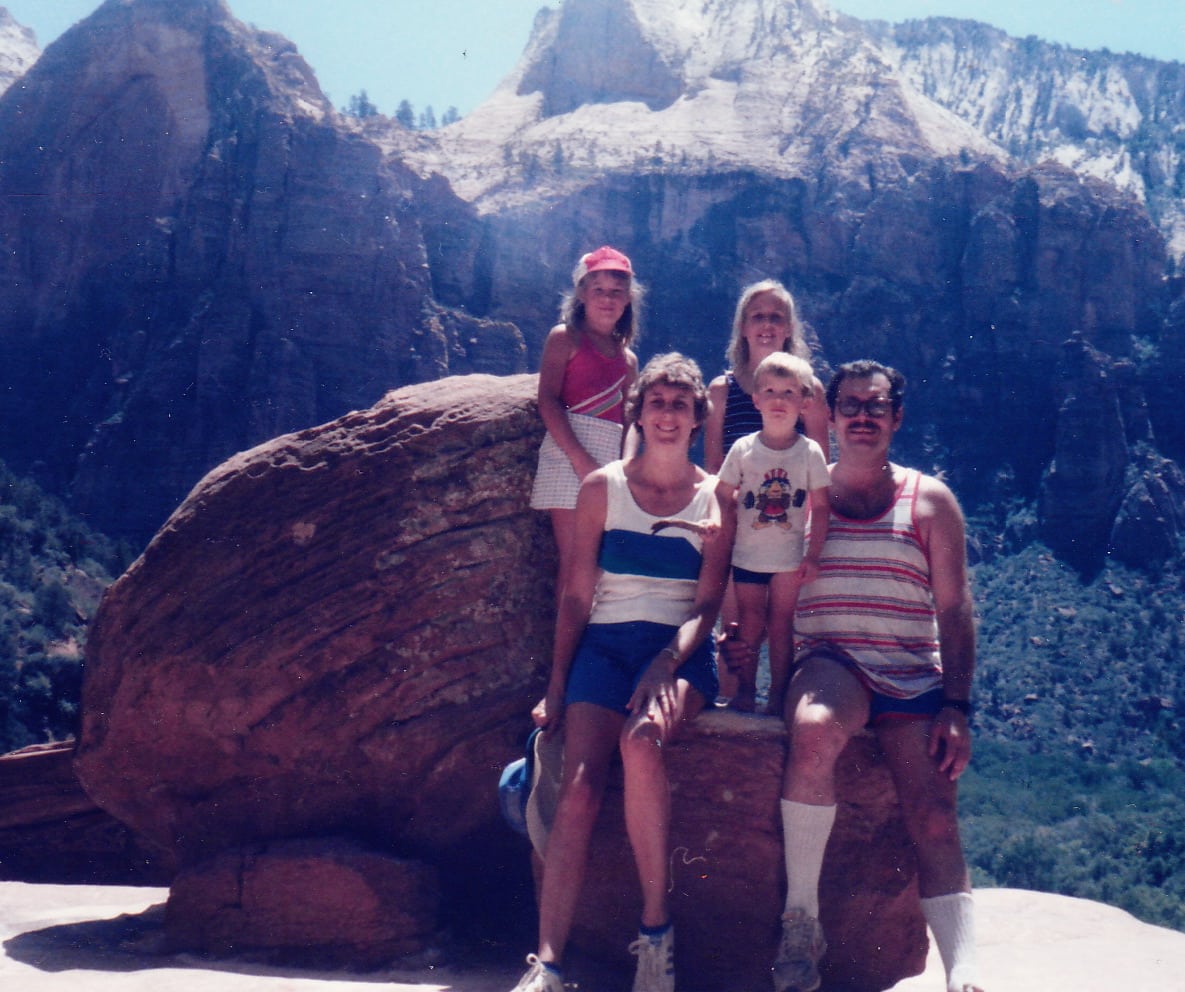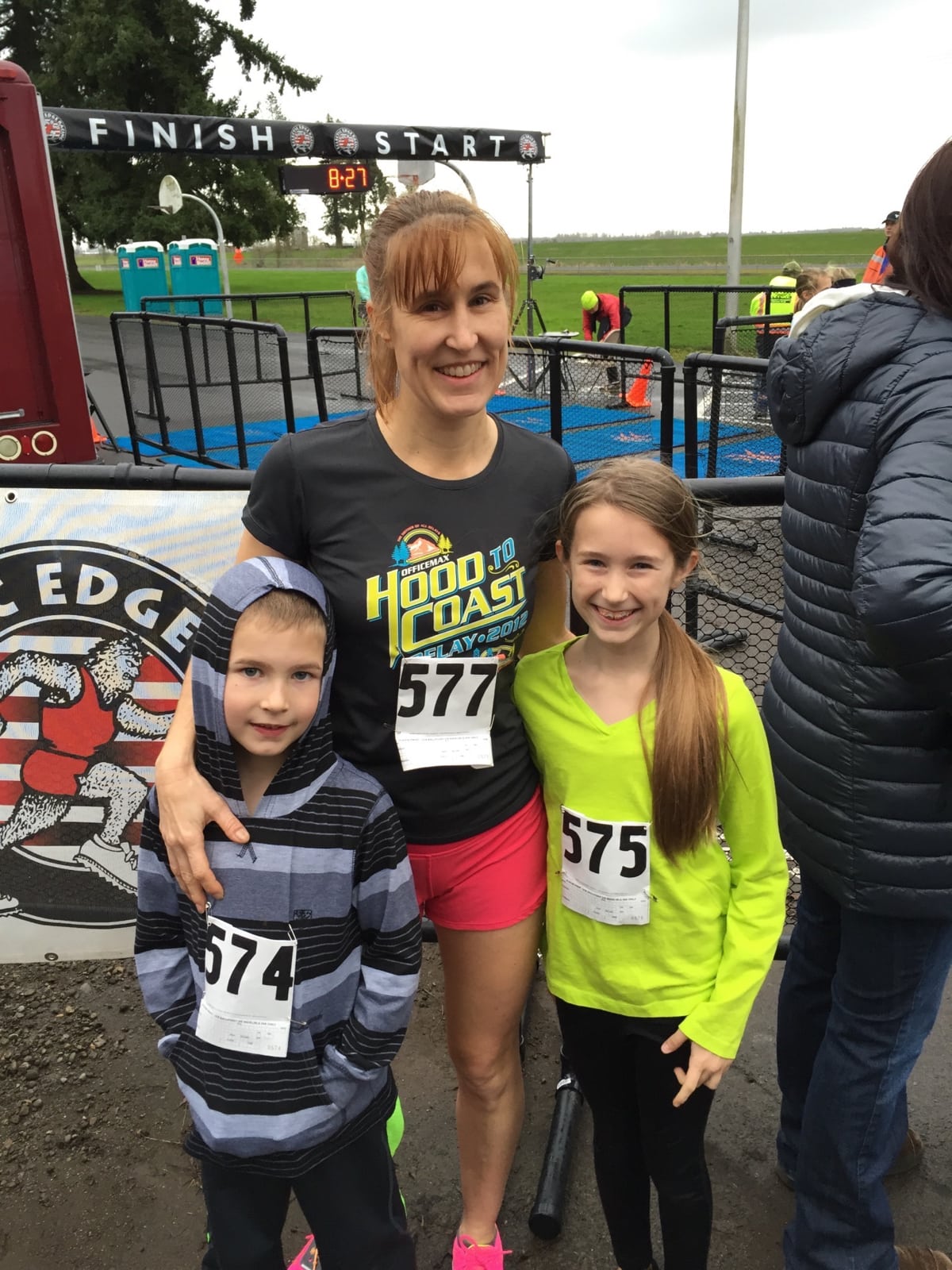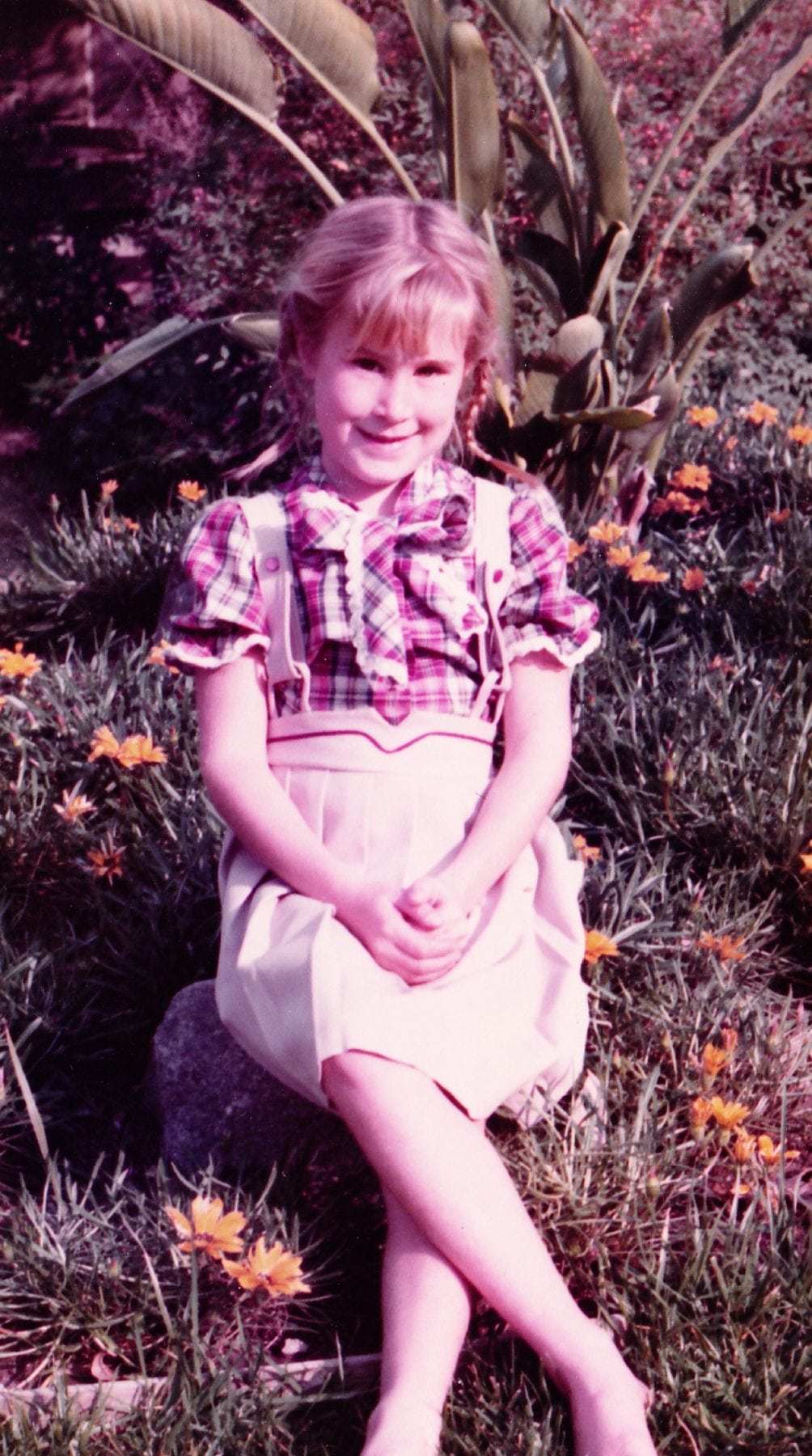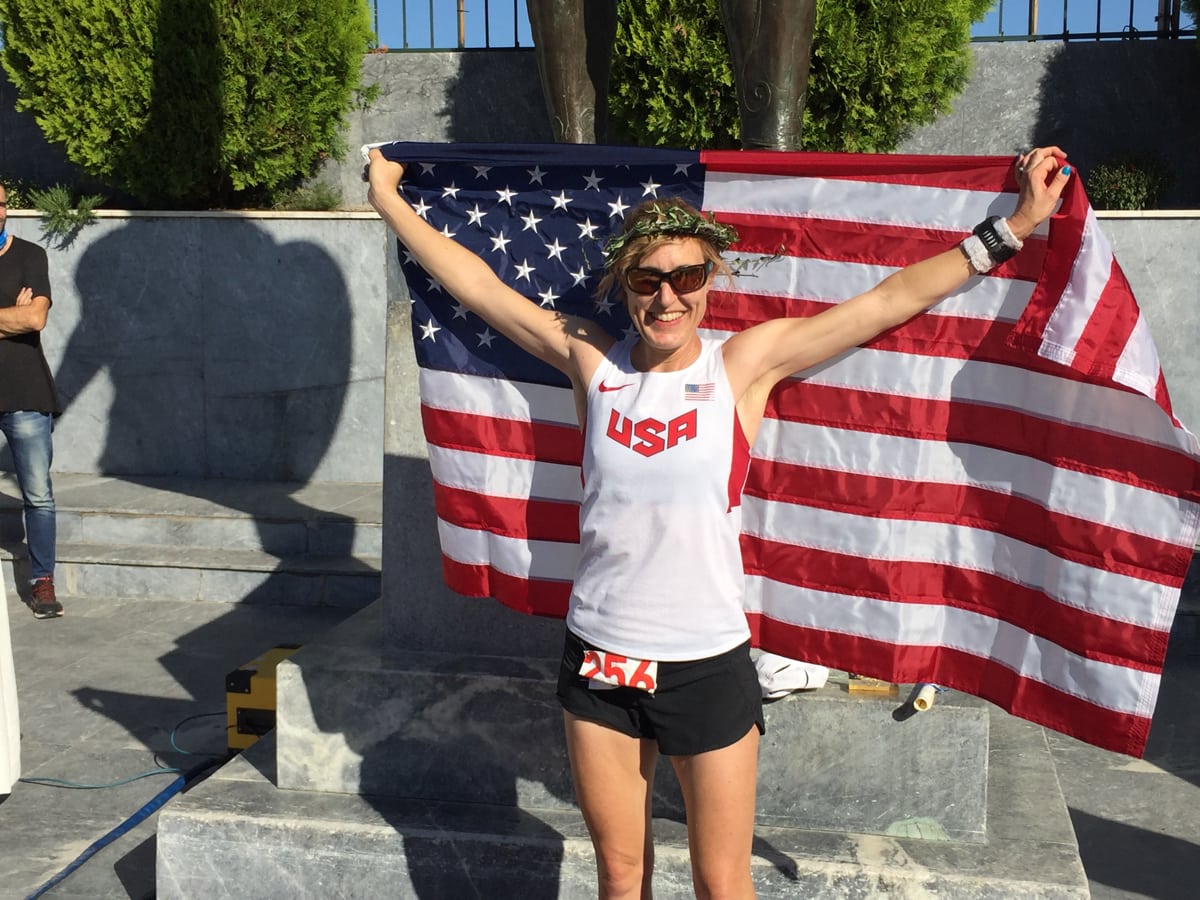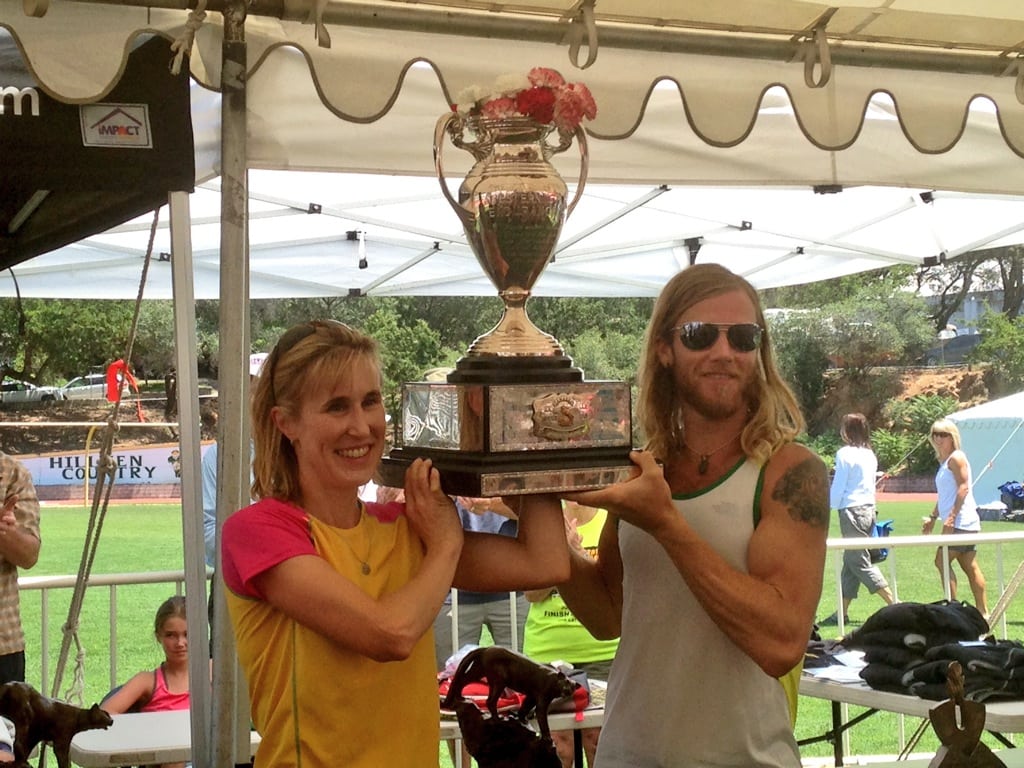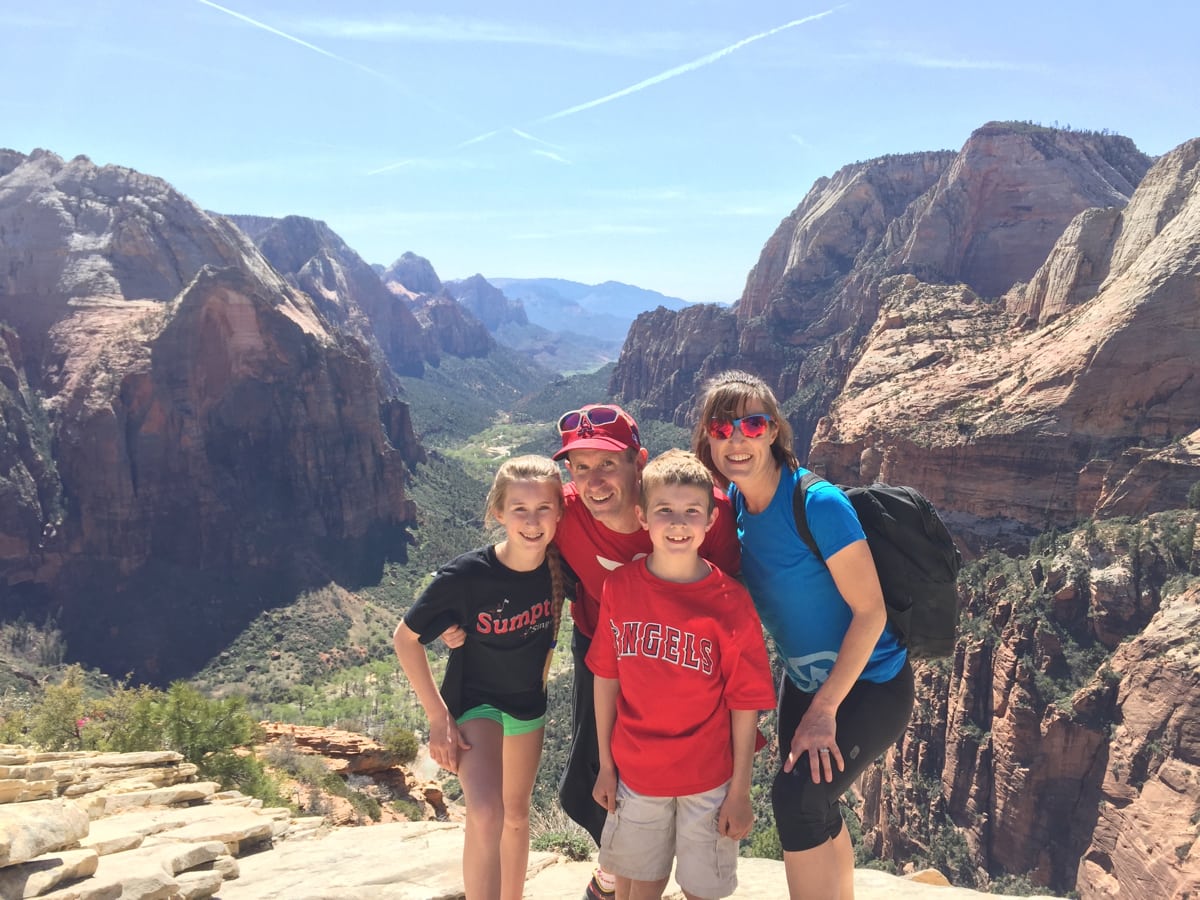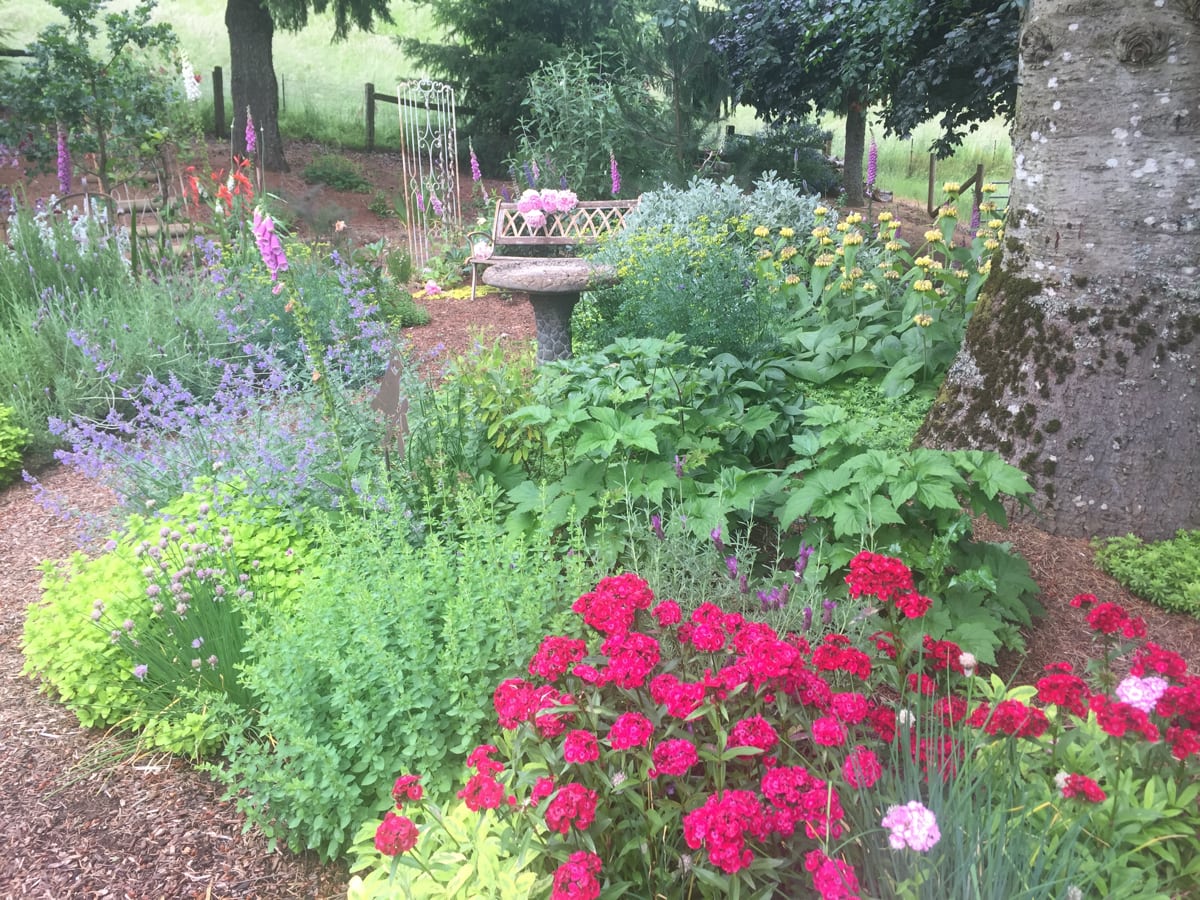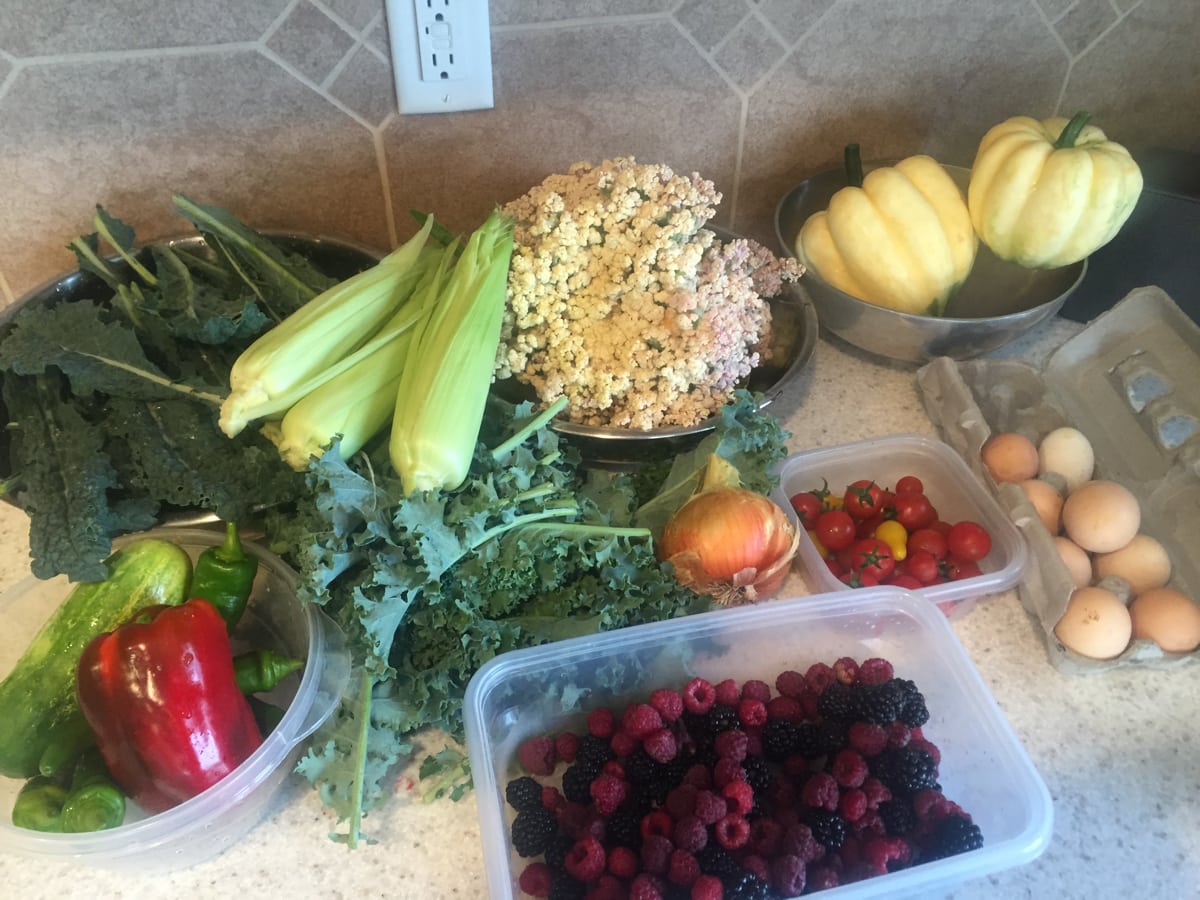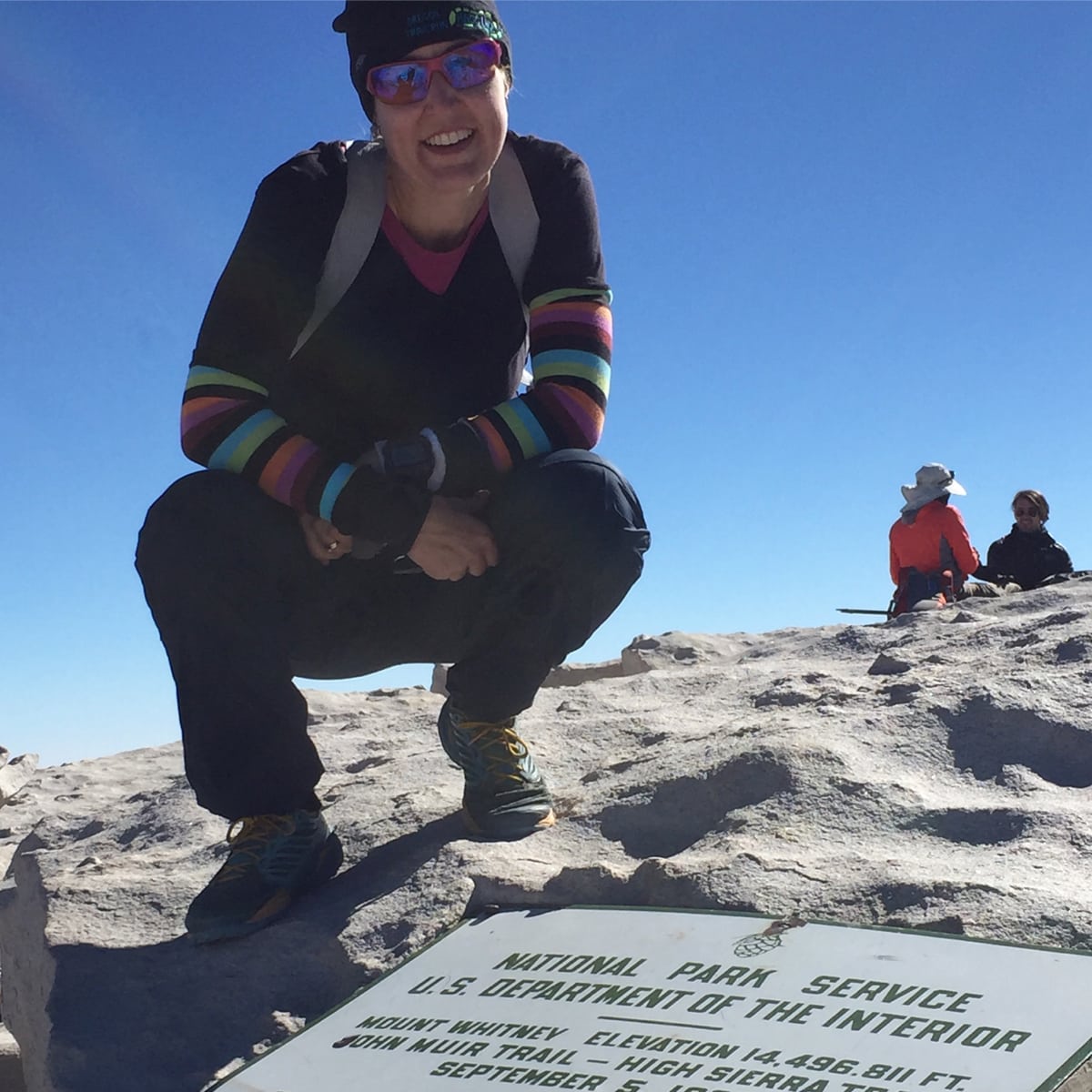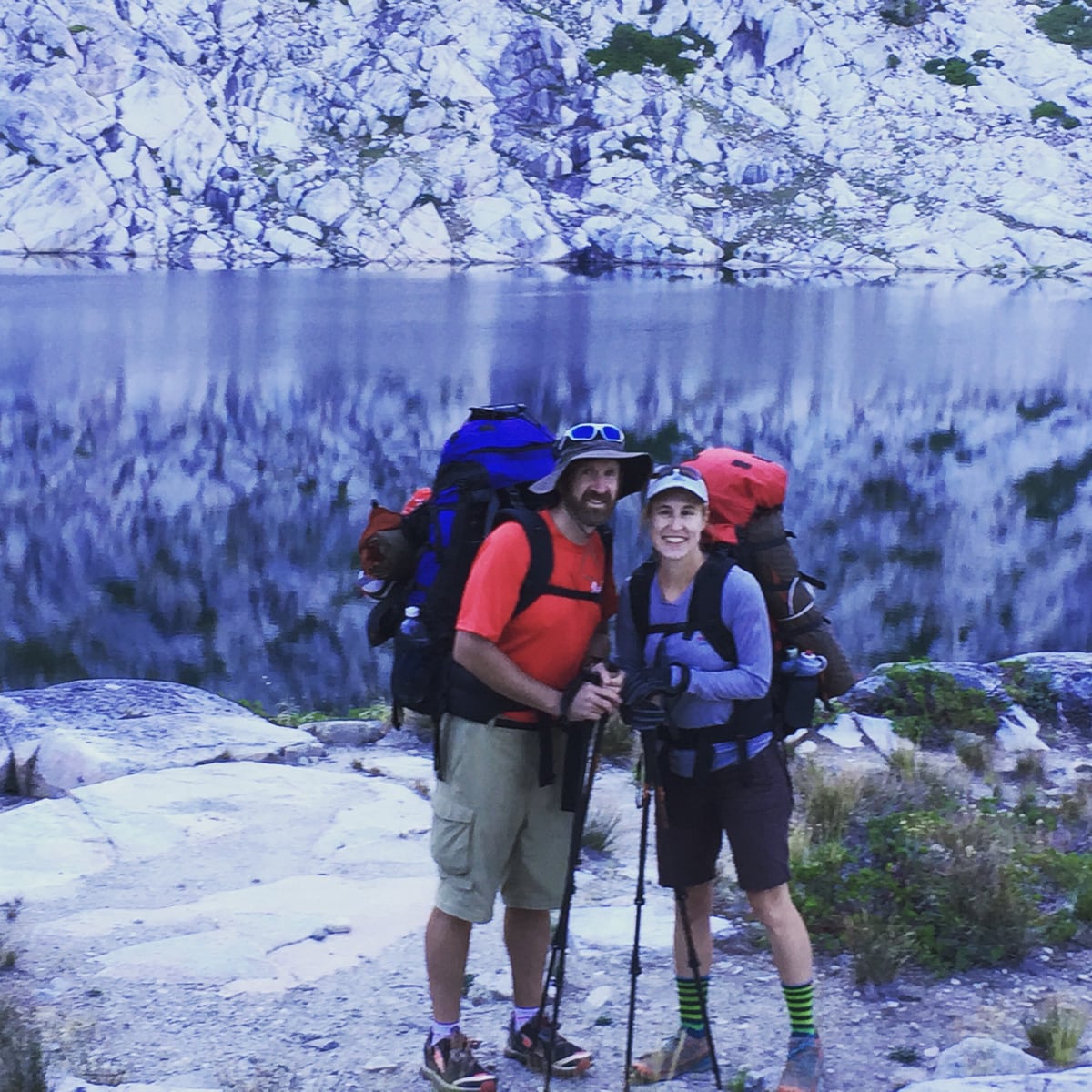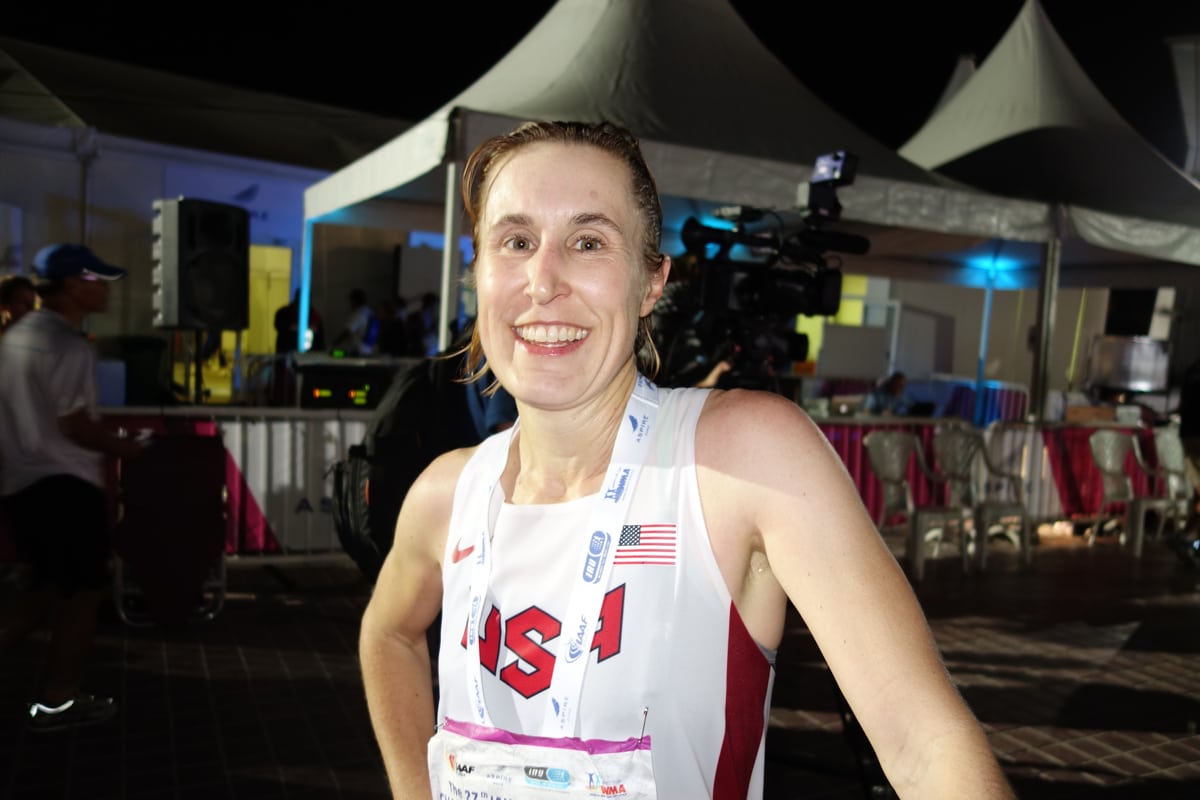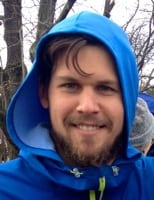Pam Smith has been a national champion, won the Western States 100, represented the United States in international competition multiple times, and set a 100-mile track world record—and she’s done it all in her thirties and forties. A lifelong runner, Smith didn’t truly start to run ultra distances until 2008. But since she met—to quote Pam’s daughter—her “crazy friends” in the ultra world, Smith has pursued the sport with vigor. Despite her dizzyingly busy schedule as a full-time physician with a family, Pam has managed to stay at the top of her game thanks to a level of self-discipline and drive that is truly inspiring.
You’ll want to get to bed early so you can make the most of tomorrow after listening to this audio preview and reading on to learn more about the great Pam Smith.
iRunFar: Let’s get right to it. How did you get into running anyway?
Pam Smith: In junior high we had to do the Presidential Physical Fitness Test and one of the aspects of that was the one-mile time trial. I didn’t put up a phenomenal time at that–I think I ran a 7:02–but it was the fastest time in the junior high and it was of note to my dad [laughs] so he got very excited about that and thought that I should go out to a local 5k with him. I did and it was in May in California and it should have been a lovely time to do a 5k but it ended up being torrential rain pouring and very few people showed up. I won my age group—the 15-and-younger age group. My dad was just so ecstatic and offered so much praise from that because he had been sort of jogging for so long—running 5ks and 10ks—and said, “I’ve been running all these years and never won and you won in your first race!” He was just very supportive and it was something that I connected with my dad to do. The following year I went out for cross country.
iRunFar: I read that you’ve only puked twice running and the first time was at a 5k in 1989.
Smith: [laughs] That was it! I actually threw up after that race [laughs]. That was the farthest I had ever run and I had done no training other than what we did in gym class, which was usually running around the baseball field and on a hard day we might have to run around the baseball field and one lap around the track—never more than a half mile probably. So I hadn’t done any training but I think I was always very good at pushing myself. Sometimes you can push yourself beyond what your training allows [laughs] and I think that’s where I was then.
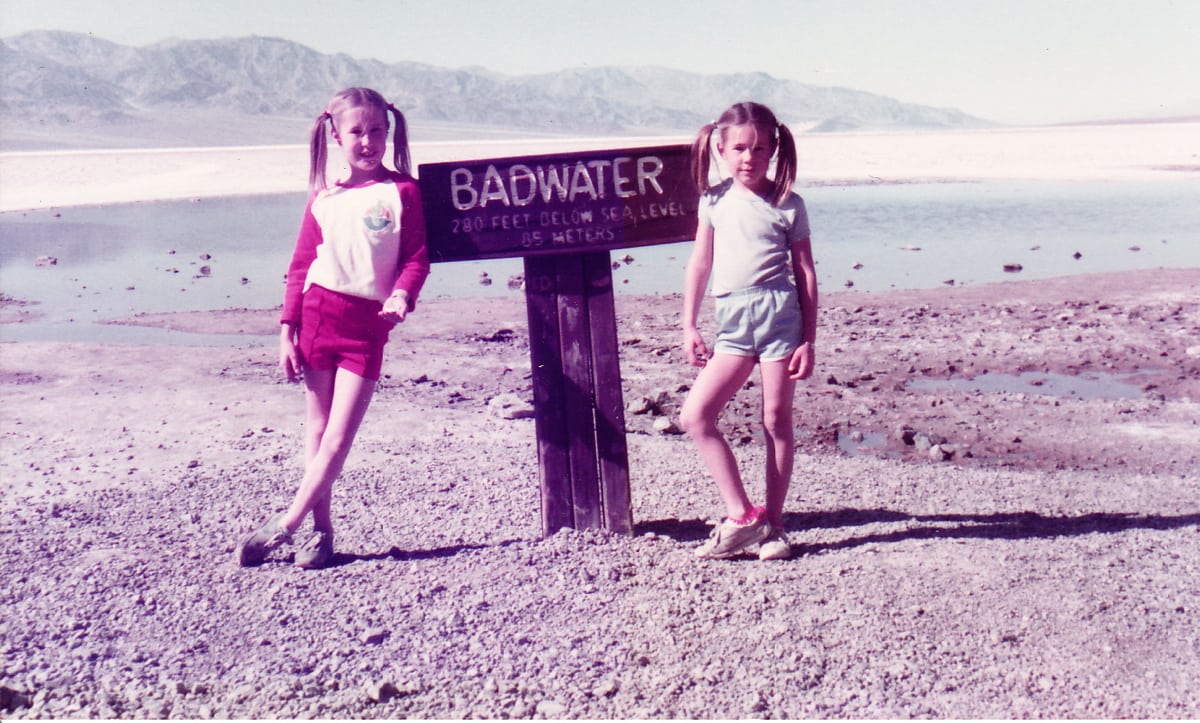
Pam Smith and her sister Sarah in Death Valley National Park, 1984. All photos courtesy of Pam Smith unless otherwise noted.
iRunFar: You learned that lesson early. Did you find other reasons to pursue running aside from your father’s praise?
Smith: I liked it more after joining the cross-country team. In junior high, I never really thought of it as a sport so much as just something people did. In junior high, you’re kind of shallow [laughs] as a teenager, and I liked the fact that I was good at something. It started because I could stand out a little bit. I was never a superstar at any other sports. I had a fairly small frame so in things like volleyball and basketball, I didn’t really stand out. This was something I found where I could win something and get praise. That appealed to the younger me [laughs].
iRunFar: Did you discover that you were competitive once you started running or did you recognize a competitiveness within yourself before running?
Smith: I grew up playing a lot of games with my family, particularly card games, and I learned to play Bridge at an early age and stuff. I always enjoyed competitive activities, it’s just that I hadn’t really been at that high level before I hit running.
iRunFar: I was reading that you play a lot of strategy games at home with your family.
Smith: Oh yeah! We play all kinds of board games like Settlers of Catan, there’s one called Puerto Rico, different games like that which have a lot of nuances to them, and card games like Bridge and Hearts as well. Those are all strategy games I grew up with—I have a younger sister and brother—and have always been competitive with.
iRunFar: And who are you playing those games with at home now?
Smith: I’ve been married [to my husband Mac] for almost 18 years. We have two kids: a 12-year-old daughter, Megan, and a 10-year-old son, Liam. I grew up in Arcadia, California but we live in Salem, Oregon now.
iRunFar: Have either of your kids caught the running bug?
Smith: Yeah, a little bit. My daughter got into running early and enjoyed it for a while. She did two ultramarathons with me, actually. We did the Pacific Rim One Day race when she was eight and nine years old. She did 27 miles the first year and 34 miles the second year, and enjoyed that. Then she got into softball and she loves softball. At one point she told me she didn’t want to run all the time like me and my crazy friends [laughs]. She’s very into softball but her math teacher convinced her to go out for cross country and now track in the junior high. So she’s still running some but more I think to please the teachers and the coaches [laughs] then because of her mother’s influence. My son loves to do 5ks. But he’s the opposite of me. He has no competitive bone in his body. He absolutely enjoys everything for the experience. He’s out there and high-fives people, he likes the races where they’re serving some sort of treat in the middle of the race. He’s stops at the aid stations in the middle for water and talks to the people serving water. He likes the costume races. He likes to be out there but not really to push himself for time, just to get out and move around. He has a lot of excess energy as a 10-year-old boy [laughs].
iRunFar: And so what brought you to Oregon?
Smith: [laughs] I started telling my parents when I was about 13 years old that I was going to go far away for college and I lived up to that. I went to Massachusetts at Williams College and then onto medical school at Temple University in Philadelphia, Pennsylvania. So I spent some time on the East Coast and then I got my residency at [Oregon Health and Science University] in Portland, Oregon, and I’ve never left the Pacific Northwest [laughs]. I came out here in 1999 for residency and then moved to Salem for my current position.
iRunFar: Did you continue to run for a team in college?
Smith: Yeah. I ran cross country and track in high school and then ran cross country and outdoor track at Williams College. I was actually the hockey announcer at Williams College, so that was my winter activity and I didn’t run much indoor track. I think I was a long-distance runner—at the time running around in circles sounded odd to me but now I’ve taken a liking to it [laughs] or I guess I have a knack for it. I was only in college for three years but I ran all three years.
iRunFar: Did it ever occur to you that really long distances were your thing?
Smith: Not too much. My dad only ran 5ks and it was a big deal for him when he wanted to run a 10k. That was the framework in which I was judging distances in running. When I got to college, I loved cross country but I knew that I was actually better as a track runner and that was because of the 10k. In track, 10k was my specialty, so by doubling the distance I was more competitive. I had that idea in college that, yes, going longer was better for me. But it never really occurred to me that I should go longer for a marathon because a marathon still seemed like a really big, crazy thing that people don’t do in college. It wasn’t until after college that I got into, or attempted to run, a marathon. So I guess at the time I knew going longer [was better for me] but I didn’t really think that there were feasible races for me to go longer.
iRunFar: You weren’t privy to the ultra world in college then?
Smith: No. It was not on my radar for sure. In medical school I had some friends that I ran with and we did different runs, and I got the idea at that point that to be a true long-distance runner, you had to do a marathon. By my final year of medical school, I did do a marathon, and then in residency it was the same thing. I got in with some running friends and I would do a marathon every other year, but it seemed like a very big deal for me at the time to run a marathon. It was very focused training and I felt like I could only do one every year or every other year or something. That’s how I got into the marathon.
In 2004 I was pregnant and had my daughter in 2005 and kind of got out of running. Between my two kids, I got out running maybe three times a week for three miles at a time. I was barely doing double digits for weekly mileage when I was pregnant with my second kid. I knew we were stopping after two kids, so finally I wanted running to be a part of my life again. I got the idea to train for a marathon again because that was a big deal but I decided that I wanted to come back and be even faster at the marathon.
So I was training to run a PR in the marathon. It took me three tries to do it. It felt like I was too obsessive about this one stupid time. At one point I missed [my PR] by two minutes and I was just crushed that I had missed this marathon PR. A couple months later I ran a marathon and broke my PR by three minutes and I was so excited. And I thought, This is ridiculous, the difference between five minutes is going to make or break the way I feel about running! It just seemed like I was a little too obsessive about it.
That’s when I signed up for the ultramarathon. I didn’t have any goals except to finish. It was a 50k, it was so much farther, and I wasn’t putting any pressure on myself. While I was there I met a bunch of people that were so friendly and after that I just wanted to do more ultras. It was so much fun, I loved being on the trails, I wasn’t looking at my watch and seeing exactly what my mile split was. I just wanted to go out and enjoy it and have fun on the trails. That’s when I started getting more into the ultras.
iRunFar: Once you got into it, you really got into it. You ran six ultras in 2009 and then 11 in 2010, including second at the American River 50 Mile and 10th at Western States. Is that your personality–you go all in?
Smith: I think it sparked more passion for me in running than it had previously. I was in for cross country and I would be very dedicated but I wasn’t the type of runner who ran year round, and I didn’t do all the workouts in the summertime like you were supposed to do. I was in when I had a group of friends and I was enjoying the cross country but to just put in miles for myself? I didn’t love it. I didn’t do it all the time.
Being on the trails, having more friends who were enjoying that, it kind of clicked for me at that point and I did fall in love with running. That’s when I wanted to be out there doing more miles and more races and just being involved more. That’s where I started to be all in. I definitely am an all-or-nothing person but I think it was also because I loved it and I wanted to be all in.
iRunFar: What was it like for you when you started running so much farther?
Smith: With road running it’s a pretty set formula. You go out, you hit the paces, and that’s basically it. For ultrarunning, this is one of the reasons it appealed to me, there’s so much more. You have the nutrition and the running isn’t just running a certain pace, you have to incorporate hill training and the downhills and weight training. Looking into all those aspects, there’s partly a strategy component that I liked, and there’s partly a science component in terms of being able to read about some of those things and doing research and reading whatever I could to figure out what would actually be the best training for some of these races. That was the scientist in me who wanted to figure out what I could do. At the time there weren’t a lot of books about ultrarunning and there weren’t many blogs or different things. It was reading some articles and blogs and talking to runners and getting information and assimilating all of that to figure out what would be the best for me.
In terms of going up in mileage, I was always super, super nervous about every new mileage, but at no time did I really feel like, Oh my gosh I don’t think I can make it. For whatever reason I always felt like I would get to the finish by the time cutoff. It might not be pretty, it might not be easy, and I think that’s what made me nervous—I knew how many things could go wrong and how badly it could hurt. Even in my first 100 miler I knew I would finish it. I just felt like I was ready to finish it. From that perspective, it made me scared of how much more could go wrong but I never had that doubt that I wasn’t going to be able to do it.
iRunFar: I wonder if that confidence was a byproduct of routinely putting your mind to something in life and accomplishing it?
Smith: I think so. Also, I’m not a very spontaneous person. Like I said, I started telling my parents that I would go away for college when I was 12 or 13. I started telling my dad in my early teenage years that I was going to med school. I spend a lot of time—even the 100 miler, it took me a lot of time to work up to that. By the time I worked up to [100 miles], in my head I had already accepted that that’s what I was going to do and that I would be able to do it. I don’t make a lot of rash decisions [laughs] and sign up for anything on the spot. It’s always something I think through first. Once I’m committed, I’m all in.
iRunFar: You once wrote that ultrarunning “defies explanation and logic, unless you’ve been there and you’ve crossed that finish line, then you see your power within, a greatness that is even bigger than you could have imagined.” I really like that.
Smith: There are many things you do in life that are a big struggle, and when you’re struggling and things get hard, you always start to doubt yourself. Why am I doing this? Does this make sense? Is this the path I want to go through? I went to medical school because I loved science, I loved the science application to helping people get better. But when I got there all of my classmates were like, “We want to go save the world and see all these patients and treat them!” And I was like, “No, I just want to learn more about the sciences.” I felt like I didn’t belong there so I was very depressed about it. I considered if I wanted to be there, if I should drop out of medical school. Maybe I made this decision when I was 15 years old and I never really thought it through. Maybe I was too stuck on that idea and too stubborn to come up with anything else. But it was like, no, there are other aspects of medicine and I do fit in, it’s just going to be a niche field and a little bit different than what everybody else does, but it’s still worth it and I still want to be here.
In running we all go through that point. At some time in the race it gets so hard, and it’s like, Why am I pushing myself? You get to the finish line though, and you look back, and you’re like, Wow, that was great that I pushed myself through that. I’m so proud of myself for doing that and I really was capable of doing that all along. That’s really powerful to have and I think you get that a lot from some of these ultras, and at the finish of them especially.
iRunFar: Is ultrarunning about setting an example for other people, for your kids, to show them that you can do what you set your mind to?
Smith: Yeah, absolutely. People often say things to me like, “Oh, I just run 5k.” And I say, “Don’t say ‘just 5k’, keep your mind open to what you can do and what you are doing.” It doesn’t have to be 100 miles but find what you want to do and if that’s what you want to do, believe that you can do it. A lot of times I do think of my kids. It’s not that I want them to be ultrarunners, but I want them to know that they can take on big tasks and things that maybe other people think are weird or too hard or crazy or whatever, but if that’s what they want to do, they’re capable and they can do it and they should do it and not let other people stop them and not let the enormity of a task overwhelm them and keep them from doing something.
iRunFar: When you won Western States in 2013, you told your crew that you wanted to be treated like a porn star. You said, “Keep me wet, keep me lubed, and keep me excited.” I have to hear more about that.
Smith: [laughs] I think I do like to keep things light and have fun. Yes, I’m a 40-year-old physician mom but I can appreciate a raunchy joke too. I wanted it fun for my crew and funny and it seemed like a good way to keep the mood light but also it did actually do a pretty good job of summarizing the things I wanted to focus on for that race [laughs]. That was the strategy of my race. It was just kind of funny that, yes, ultrarunning, if you just said it like that, is parallel to a porn-star life [laughs]. It’s a good strategy.
Obviously running 100 miles is a serious undertaking but at the same time you need to have some levity about the situation. You’re basically putting yourself in that situation voluntarily. As serious and big as it may seem, at the end of the day it’s also kind of ridiculous.
iRunFar: Between a full-time job, a family, and running, I understand you have an insanely busy schedule. What does that look like on a given day?
Smith: [laughs] Yeah, I get up most mornings somewhere between 4:15 and 4:30 so that I can be running by 5. It doesn’t take me 45 minutes to get ready to run but it takes me that much time to pack up my lunch, pack up the clothes I’ll wear for the day, and get everything ready because once I leave the house in the morning, I go for my run, I shower either at the gym or at work, I go to work and have a full day at work—I’m a full-time physician. But the good news is that pathology is a little bit less demanding on time than some of the other medical fields, so I’m reading slides all day for the most part, and I have a few patient procedures but they’re always scheduled so I don’t have anybody dropping in emergency so that part is nice. Usually I leave from work around 4 in the afternoon and then there’re a lot of kids activities. My kids are in piano, karate, a running club, and softball, so almost every day of the week we have something to get to, then we get home and have dinner and make sure that everybody’s set, homework’s done, any other things that need to be taken care of in a day, and then I try to get to bed by 9 because I’m up so early. That was pretty easy to do when my kids were younger but it’s getting harder to do now that they’re older because, especially with my older one, she doesn’t go to bed at 9 anymore [laughs].
There are many, many days still that I’ll go to bed before them and they probably tuck me in as often as I tuck them in now. Sometimes the bedtime thing gets drawn out because there’s stuff going on with the family but I still do try to get to bed pretty early because I am keeping that schedule. On Saturdays I do my long run and often I’ll start by 5 in the morning so I can be done and get to softball games and other activities and be home. I’m not one for doing back-to-backs on the weekends, mostly because I feel like I can’t justify being away two days of the weekend for my own activities when I have the family. For a while my husband was running ultras so he was training on Sunday mornings. That was my thing to maybe get out for 10 miles early but to be home all day on Sunday.
iRunFar: I’m worn out just listening to all that [laughs].
Smith: Yeah, for me the time for tapering and recovering from a race is almost more about tapering and recovering from the training cycle rather than the race itself because I tend to not get up early and go for a run when I’m recovering and it’s just very nice to have a week or two where I don’t have to think about every little planned detail like packing breakfast and lunch and laying out all my clothes and shoes and all of that stuff. It’s very nice to just run four miles in the afternoon—part of it’s the physical recovery but it’s also just to have that mental break where you’re not on training mode [laughs].
iRunFar: Do you have time for anything outside of that busy schedule?
Smith: I love to garden. In addition to ornamental gardens around the house, I have a huge vegetable garden. We raise chickens, too, for eggs. I really like to cook, especially using homegrown ingredients.
iRunFar: How difficult is it to maintain your schedule? Is it clockwork or is it about really overcoming a desire to sleep more or whatever?
Smith: I can’t say that I love to get up at 4:30 every single morning [laughs] now that I’ve been doing it for so many years. But it’s just that I know that it’s what I’m going to do. I don’t sit there and hit snooze or debate in my head if I’m going to get up or not. I know I’m going to do it. I don’t always love it but it’s like going to work. You know you’re going to go to work the next day because that’s what your plan is or that’s what you do. I get up and it’s part of the routine, I do it, and I think that getting to bed early makes that routine a lot easier to stick to because it’s not sustainable if you’re completely sleep deprived all the time.
The hard part is not getting up early, it’s getting to bed early and extracting yourself from family stuff and saying, “No, I need to get to bed right now or I won’t be functional at the end of the week.” [laughs] I’ve gotten used to that. The other part of it that’s been really helpful is I’ve gotten in with a group of people. I’ve found people that will run at 5 in the morning. Having someone that you know is there waiting helps me to maintain that routine.
iRunFar: You might have the most self-discipline of anyone I’ve ever talked with. What does your husband think?
Smith: I think my husband would tend to agree with you on that [laughs]. Even when he was running ultras, for him it was just to finish, he was never competitive or trying to do more than just enjoy being out there, so he definitely would say that—he doesn’t always understand the discipline or the need to keep getting out there.
iRunFar: Well, what is the need to keep getting out there?
Smith: At this point I identify myself with being a runner. Most of my social interactions are with runners and a good part of my day is not just meeting those people because they’re going to get me through a workout, but because I enjoy hanging out with those people and that’s my time to talk to them as well. When I’m not running it feels like a piece of me is missing—that’s who I am. If I’m not doing that, who am I? I think that keeps me feeling whole but also I like that thing to focus on and to have something to funnel that competitive drive into. The obsessiveness—if I didn’t have [running] I would funnel that into something that might not be good [laughs]. You know, I might get crazy about cleaning my house or making sure the kids are doing everything perfectly or something and I don’t think that would be healthy for anybody [laughs]. It’s good for me to have my activity and be able to enjoy that and feel like I’ve got something that I’m doing every day that I love and that gets me through some of the hard stuff as well, some of the stuff I don’t love.
iRunFar: Does that mean you intend to run until your last breath?
Smith: It’s interesting you should say that. I’m kind of in the midst of my mid-life crisis, if you will. With my kids being 10 and 12, I realize that their time being home and being part of the nuclear family is limited, and also I’m turning 43 this year and the idea that my competitive-running career is also on a somewhat limited timeline as well. I have decided downward in my professional career and I’ll be going to work just two days a week starting this summer. Some of that is to be able to pursue more time with my kids and enjoying the outdoors more.
For me, in terms of running long term, it’s more about getting out and enjoying the trails. I could see myself doing more backpacking as I get older or just day runs that aren’t necessarily competitive races, but just being outside and finding the beautiful places and checking off beautiful places on my bucket list rather than trying to get to all the different races on my bucket list. But I do hope to be active and doing stuff and getting out, yeah [laughs], basically until my last breath. I just don’t have to be in a training plan or geared toward a certain race.
iRunFar: Before we get too far ahead, how about what’s next? You’re signed up for the Georgia Death Race and Lake Sonoma 50 Mile. Are you trying to get back to Western States?
Smith: I’m not going for a Golden Ticket [laughs]. I am sitting in the number-five spot for the U.S. 24-Hour Team right now and the top six get selected and that’s on July 2, which is just a week after Western States. I’ve had six finishes at Western States and I’d love to get to 10 if I can, but I feel like I’ve put a lot of effort and focus on Western over the years so I’m excited to try something new and different and that’s going to be the 24-hour team as long as my qualifier holds up. The date closes on April 2. If by some chance I don’t get on the 24-hour team and I happen to get the [Western States] qualifier, I’d take it. But as along as I get on the team, I won’t go to Western States. It’s not a done deal to get the Golden Ticket anyway [laughs]. I have no chance at getting a ticket at Lake Sonoma. I’m not fast enough at 50 miles on that kind of terrain to compete with the high level of competition that will be there. I’ll just be there for fun and to drink wine.
iRunFar: What are some of the future goals for your competitive career?
Smith: I’m going to the IAU 24-Hour World Championships as I mentioned before. I put up a qualifier but I don’t feel like I’ve truly focused on that event. I would like to have a good race at 24 hours. Running that kind of mileage–maybe over 150 miles in 24 hours–is something I would love to do. I know this is tough with entry, but I would love to get the 10-year buckle at Western States, so finish Western States another four times. You have to stay very competitive to get the spots or get very lucky. It gets harder and harder to do.
I would love to do UTMB and Hardrock but I don’t feel as much of a competitive drive in those races. I don’t know if that’s because that’s not exactly my type of running—I don’t do quite as much rugged mountain running as that—or if it’s just because the scenery seems so spectacular. Those are ones I’m kind of pushing for at the end, when I’m slowing down a little bit and I can enjoy those races, but I would love to have the opportunity to do them at some point. I still love the 100k team so if I can keep getting onto the U.S. 100k Team, I’ll keep doing that as well.
iRunFar: Is there a way you want to be remembered, as a runner, years from now?
Smith: One of the things that motivates me doing well now is the idea of leaving a mark in ultrarunning, even though that might be a very tiny mark, but having something that is pushing people to do something a little bit better. Maybe some of the records on the track—and track racing seems to be more popular, not because of me, but I like the idea that maybe I was somewhere on that timeline and I played a little part in that somewhere. It was the same thing with Western States. I certainly wasn’t favored to win Western States, but I think the idea of having a very meticulous approach and paying great attention to the heat management. So to get people thinking about things a little bit differently, I like that, and I like being woven into the history of ultrarunning. I’d like people to look back and see that I played a small but important part in the point in the curve where things jumped off in terms of popularity.
And I guess one more thing, as a mom, it’s important to me how my kids think of me. I’m excited to have my kids think of me as more than just their mom, if that makes sense, like I had a life of my own at that time, while I was raising them. I want them to have that going forward. Yes, I want them to be amazing parents if that’s in their future, but I also want them to be amazing people outside of that and to follow their dreams and their passions and know that you can have a family and do those things as well. I hope my kids will look back on me positively.
Call for Comments (from Meghan)
It’s time for Pam Smith stories! Got one?! Leave a comment to share your story about Pam.
